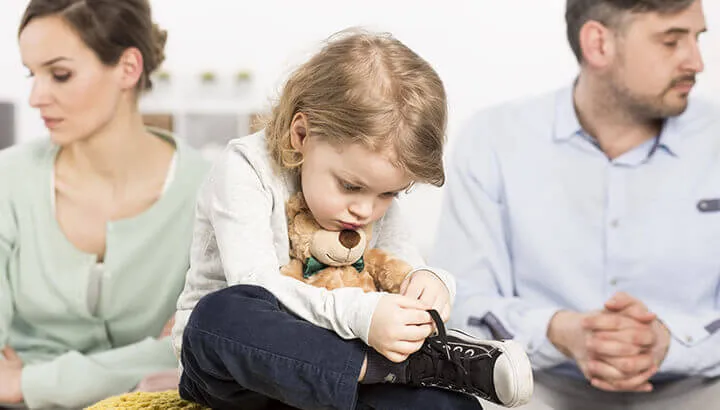
- Share on Facebook96
- Share on Pinterest
- Share on Twitter
Dealing with a divorce is rough enough, and it may be tempting to keep your kids out of it. In fact, research over the last five years has found that over 75 percent of parents going through a divorce spend less than ten minutes, total, talking to their children about the change.
The statistic is shocking, really, considering how clear it is made to us as adults that good communication is vital to all types of relationships. Perhaps adults forget that that little law of life involves children as well, and how much children value being part of decision making, and even being welcomed into the adult world.
Here is how to talk about divorce with your kids:
1. Breaking up isn’t a crime
The end of a legal relationship, or a cohabiting one, isn’t a crime that needs to be covered up, sugar coated or kept from children like a dirty secret.
Interestingly, children are often more aware that divorces can be necessary than their parents. A UK poll found that 82 percent of older kids aged 14 to 22 preferred that their parents part if they are unhappy, than that they stay together just for the sake of their kids.
Your starting point here, then, is your own clarity about what you are going through. Life is full of interesting stages and processes that start and end. We start and finish school, college or a job, and in the same way, separation isn’t necessarily a failure. And if you feel yours is, I’m sure it’s at least more complicated than that. It’s also worth understanding that even failure is a vital part of life, and not something to be ashamed of.
In fact, as an alternative education teacher, I encourage the children I work with to “fail” because it means they are trying, over and over, and learning lessons from that, rather than being scared of trying things in the first place.
2. Children need examples of healthy relationships, not fairy tales
My parents fell out of love when I was five years old, but they didn’t get divorced until 12 years later. All that made for an unhappy home and a childhood filled with verbal violence and stress. I would have much preferred a few honest and tough conversations.
Children start to imitate adults from the age of around four — they want to cook like us, pretend to have friends over to tea, fix things with hammers and play “family.” So adults need to be good examples to them, and that means modeling good relationships, not acting out movie-perfect, unrealistic romances.
Families come in all shapes and sizes, with all different combinations of parents — including single ones, ones in relationships with someone other than the biological mother or father and same-sex parents. None of this matters. What matters for a child is a positive home environment, where respect and honesty is honored. And by the way, honesty means a place where parents aren’t pretending to have feelings for each other that they don’t have. Would you want your children to do that in their own friendships or romances?
Kids need to be taught that relationships evolve and change, that communication, respect and honesty are paramount. Teach them that and you’ll be paving the way for their own healthy relationships in the future. Teach them not to stay in an unhappy relationship just to make others happy.
3. Divorce isn’t an announcement, it’s a conversation

Even though your relationship with your partner is uniquely your business, your children are directly involved in that relationship also. You’ll make the decision to divorce, but understand that the details are going to involve your children. Therefore, the divorce can’t just be announced. It needs to be a dialogue, where the children are listened to, and their feelings and ideas are taken into account.
A ten-minute conversation isn’t enough! Answer your children’s doubt. Express yourself. If you feel sad, say that — don’t hide it. If you are unsure about how something will play out in the future, admit to not having all the answers. Be real: it’s okay to not know things, and it’s useful modeling to be able to express your feelings, rather than acting cold and distant.
4. It’s not about blame
However, even though you want to be honest with your children, if you’re holding feelings of resentment and blame towards the other partner, that’s something best kept to yourself. Unless there has been abuse, your children need to be free to keep loving both of you without feeling that to do so is betraying one of you.
So, at this point, you need to make sure the following things are very clear:
- The kids are not the reason for the separation. They, too, are not to blame.
- You will keep being a family, it will just work differently.
- All the feelings the children have in response are okay and shouldn’t be squashed. It is okay for them to feel confused, angry, sad, worried or curious.
When you chat with your kids, aim to do it in a quiet place, with your partner if possible, and at a time when there aren’t pressing things to do. That way, nothing will get in the way if the conversation needs to go on for a while.
Also, if you have older and younger kids, tell them all at once. It isn’t useful to divide the kids, telling the older children first as though they can “handle” the news better, and must then explain it to the younger kids, or keep secrets.
5. After the conversation: helping children deal with change and loss

Children at different ages, and more generally speaking, cope with big changes in different ways. Some kids feel insecure, go quiet, become mischievous, clingy, uncooperative or distant. But they can also be amazingly resilient — bouncing back quickly.
However your child reacts, their change in behavior shows that they need to keep talking, so give them opportunities to do that. Show them love, and at the same time, keep many of their routines consistent.
Do you have any extra tips or steps when it comes to such conversations with children?
— Tamara Pearson
- Share on Facebook96
- Share on Pinterest
- Share on Twitter

